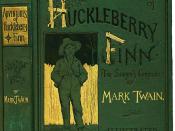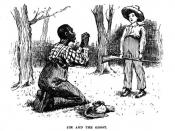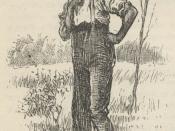Mark Twain's novel, Adventures of Huckleberry Finn is a brilliant satire against racism. Two significant reasons support this thesis. First, the various subplots within the novel itself serve to disdain not only the 'peculiar institution' of slavery, but also its place in Southern society. Second, the development of what many consider to be the hero of the story, Jim, serves as an example of the humanity of African-Americans during a time period in which African-Americans as a whole were associated with a type of animalism.
Adventures of Huckleberry Finn, through the developments of the innumerable subplots, undermines what many have come to believe as the perfect antebellum new frontier, a time of religious piety and relative prosperity. Throughout the novel, slavery is disdained as a terrible practice and one that should be stopped; provided that the reader will 'read between the lines'. This is true because the dialogue within the text itself is quite insensitive to the modern reader, with the word 'nigger' appearing in it approximately two-hundred and twenty-seven times.
For example, when Pap Finn complains to Huck about an African-American who can vote,
"And that ain't the wust. They said he could vote when he was at home. Well, that let me out. Thinks I, what is a country a-coming to? It was 'lection day and I was just about to go and vote myself... but when they told me there was a state in this country where they'd let that nigger vote, I drawed out. I says I'll never vote ag'in... Here's a govment that calls itself a govment, and let's on to be a govment, and thinks it's a govment, and yet's got to set stock-still for six whole months before it can take a hold of a prowling, theiving, infernal, white-shirted free nigger."
If the reader looks only at the dialogue instead of what Twain means, he or she will certainly be disgusted. He must instead look at the fact that Pap Finn himself is an uneducated, backwoods hick with a serious drinking problem and a penchant for beating his own son to within inches of his life. Who is he to pass judgment on an entire era in American history? Who is Pap Finn, a fictitious character, to give us a first-hand account of antebellum sentiments? The answer to both is that Pap Finn should not ever be allowed to address any serious issues pertaining to national politics, because it seems that all of his answers are found at the bottom of a bottle. Twain chooses to tell his story through the eyes of those that history seems to skip over, and in doing so, he seems to burn a few bridges; but this is what has made his work great.
The way in which Jim develops through the novel is critical to Twain's overall message in Adventures of Huckleberry Finn that African-Americans were and are people capable of all that comes to be associated with humanity. Twain, or rather, Huck, gives us several examples of this. Jim's thoughts, conversations, and actions while interacting with Huck, as well as others, shows us that Jim, as well as slaves in general, are people just as the white man is. Jim's sadness and sense of relief while he and Huck are separated in the fog at Cairo, his sense of regret for striking his daughter Lizbeth for perceived insubordination, and his willingness to put others' lives in front of his own, such as when he helps save Tom Sawyer, all express this. These points are but a few examples of Jim's humanity. Although he is uneducated and poorly-spoken, he shows a true willingness to obtain his freedom, not for personal reasons, but to also secure his family a life of freedom as well. Surprisingly, he helps Tom Sawyer in the end of the book, setting aside his own freedom to help, ironically enough, the very person who was toying with his own freedom for personal enjoyment. This shows us, again, that Jim is an empathetic and emotional being. With all these examples, and more to boot, Twain created a telling satire against slavery.
In short, through Adventures of Huckleberry Finn, Twain gave all Americans a forceful social commentary against racism and stereotypes that scorned Southern society for its various misconceptions in regard to the African-American community. Readers would hope that Adventures of Huckleberry Finn helped prompt serious social change even after the Civil War, when it was written. Pap Finn tells sentiments against equal rights, while the general plot of the book argues against its own dialogue time and time again, if the reader cares enough to dive into more than the face value of the book. Jim shows us that there is humanity in all of us, regardless of the color of our skin, the way we talk, or what we do or do not know. Twain has truly given a gift for the ages, and one that readers should be so lucky to have pass the test of time, censorship, and all other adversities that shall surely spring up in the years, decades, and quite possibly, centuries to come.


